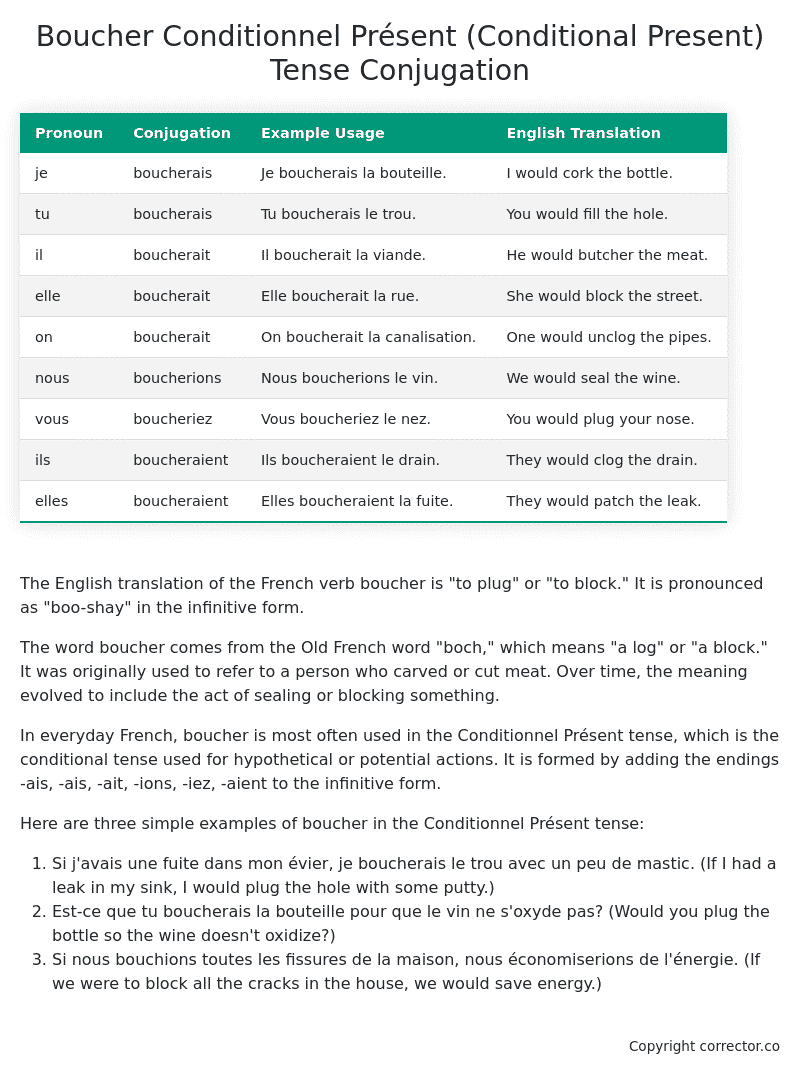Conditionnel Présent (Conditional Present) Tense Conjugation of the French Verb boucher
Introduction to the verb boucher
The English translation of the French verb boucher is “to plug” or “to block.” It is pronounced as “boo-shay” in the infinitive form.
The word boucher comes from the Old French word “boch,” which means “a log” or “a block.” It was originally used to refer to a person who carved or cut meat. Over time, the meaning evolved to include the act of sealing or blocking something.
In everyday French, boucher is most often used in the Conditionnel Présent tense, which is the conditional tense used for hypothetical or potential actions. It is formed by adding the endings -ais, -ais, -ait, -ions, -iez, -aient to the infinitive form.
Here are three simple examples of boucher in the Conditionnel Présent tense:
- Si j’avais une fuite dans mon évier, je boucherais le trou avec un peu de mastic. (If I had a leak in my sink, I would plug the hole with some putty.)
- Est-ce que tu boucherais la bouteille pour que le vin ne s’oxyde pas? (Would you plug the bottle so the wine doesn’t oxidize?)
- Si nous bouchions toutes les fissures de la maison, nous économiserions de l’énergie. (If we were to block all the cracks in the house, we would save energy.)
Table of the Conditionnel Présent (Conditional Present) Tense Conjugation of boucher
| Pronoun | Conjugation | Example Usage | English Translation |
|---|---|---|---|
| je | boucherais | Je boucherais la bouteille. | I would cork the bottle. |
| tu | boucherais | Tu boucherais le trou. | You would fill the hole. |
| il | boucherait | Il boucherait la viande. | He would butcher the meat. |
| elle | boucherait | Elle boucherait la rue. | She would block the street. |
| on | boucherait | On boucherait la canalisation. | One would unclog the pipes. |
| nous | boucherions | Nous boucherions le vin. | We would seal the wine. |
| vous | boucheriez | Vous boucheriez le nez. | You would plug your nose. |
| ils | boucheraient | Ils boucheraient le drain. | They would clog the drain. |
| elles | boucheraient | Elles boucheraient la fuite. | They would patch the leak. |
Other Conjugations for Boucher.
Le Present (Present Tense) Conjugation of the French Verb boucher
Imparfait (Imperfect) Tense Conjugation of the French Verb boucher
Passé Simple (Simple Past) Tense Conjugation of the French Verb boucher
Passé Composé (Present Perfect) Tense Conjugation of the French Verb boucher
Futur Simple (Simple Future) Tense Conjugation of the French Verb boucher
Futur Proche (Near Future) Tense Conjugation of the French Verb boucher
Plus-que-parfait (Pluperfect) Tense Conjugation of the French Verb boucher
Passé Antérieur (Past Anterior) Tense Conjugation of the French Verb boucher
Futur Antérieur (Future Anterior) Tense Conjugation of the French Verb boucher
Subjonctif Présent (Subjunctive Present) Tense Conjugation of the French Verb boucher
Subjonctif Passé (Subjunctive Past) Tense Conjugation of the French Verb boucher
Subjonctif Imparfait (Subjunctive Imperfect) Tense Conjugation of the French Verb boucher
Subjonctif Plus-que-parfait (Subjunctive Pluperfect) Tense Conjugation of the French Verb boucher
Conditionnel Présent (Conditional Present) Tense Conjugation of the French Verb boucher (this article)
Conditionnel Passé (Conditional Past) Tense Conjugation of the French Verb boucher
L’impératif Présent (Imperative Present) Tense Conjugation of the French Verb boucher
L’infinitif Présent (Infinitive Present) Tense Conjugation of the French Verb boucher
Struggling with French verbs or the language in general? Why not use our free French Grammar Checker – no registration required!
Get a FREE Download Study Sheet of this Conjugation 🔥
Simply right click the image below, click “save image” and get your free reference for the boucher Conditionnel Présent tense conjugation!

Boucher – About the French Conditionnel Présent (Conditional Present) Tense
Formation
Common Everyday Usage Patterns
Expressing Polite Requests
Expressing Hypothetical Situations
Expressing Doubt or Uncertainty
Interactions with Other Tenses
Present Tense
Past Tense
Future Tense
Conditional Perfect
Summary
Want More?
I hope you enjoyed this article on the verb boucher. Still in a learning mood? Check out another TOTALLY random French verb conjugation!


